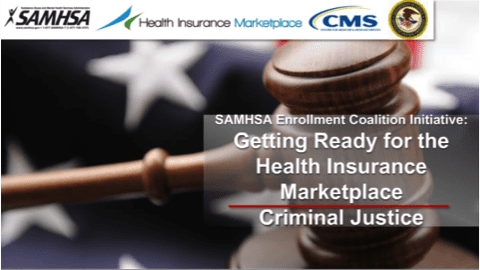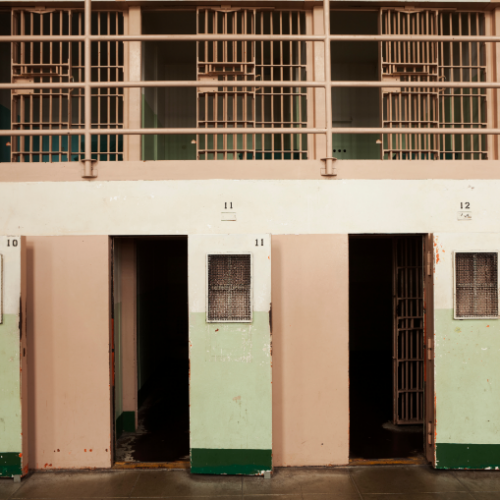SAMHSA Releases New Tools to Help Connect Individuals Involved with the Criminal Justice System to Health Coverage
 Working in collaboration with criminal justice stakeholders, the Substance Abuse and Mental Health Services Administration (SAMHSA), has released a new online, interactive toolkit Getting Ready for the Health Insurance Marketplace that describes the Patient Protection and Affordable Care Act (ACA) and provides resources to encourage uninsured individuals to apply for health coverage beginning on October 1, 2013.
Working in collaboration with criminal justice stakeholders, the Substance Abuse and Mental Health Services Administration (SAMHSA), has released a new online, interactive toolkit Getting Ready for the Health Insurance Marketplace that describes the Patient Protection and Affordable Care Act (ACA) and provides resources to encourage uninsured individuals to apply for health coverage beginning on October 1, 2013.
The toolkit is composed of three sections. The first section gives a basic overview of ACA, how it works, and why it is important for uninsured individuals with behavioral health conditions. The second section explains how the Health Insurance Marketplace works, how to apply for health coverage, and where to get help. The third section contains numerous communication ideas and materials from the Centers for Medicare and Medicaid Services (CMS) that can be used to create awareness and motivate uninsured individuals to enroll.
Because as many as one-third of those newly eligible for coverage under ACA will have a history of involvement with the criminal justice system, criminal justice agencies can play a crucial role in connecting these individuals to coverage. Useful resources and materials can be downloaded directly from the toolkit. Among the communication resources provided in the toolkit are articles, brochures, fact sheets, presentations, videos, posters, cards, outreach messages, flyers, widgets, and social media resources. Many of the materials are available in multiple languages and customized for specific population segments, such as different ethnic or racial groups.
To learn more about the toolkit, click here.
A positive school experience, where a child feels secure, is essential for their well-being. However, for many children…
Read MoreWhen returning to their communities from criminal justice settings, people with behavioral health needs face barriers in accessing…
Read More Supporting Children of Incarcerated Parents: Reimagining School and Community Collaboration
Supporting Children of Incarcerated Parents: Reimagining School and Community Collaboration
A positive school experience, where a child feels secure, is essential for their well-being. However, for many children with incarcerated parents—one in 14 in the U.S.—school can feel far from safe due to stigma, trauma, and a lack of understanding.
Read More Bridging Communities and Correctional Systems: Q&A with CSG Justice Center Advisory Board Member Commissioner Nicholas Deml
Read More
Bridging Communities and Correctional Systems: Q&A with CSG Justice Center Advisory Board Member Commissioner Nicholas Deml
Read More
 Assigned to the Cloud Crew: The National Incarceration Association’s Hybrid Case Management for People with Behavioral Health Needs
Assigned to the Cloud Crew: The National Incarceration Association’s Hybrid Case Management for People with Behavioral Health Needs
When returning to their communities from criminal justice settings, people with behavioral health needs face barriers in accessing basic needs—including food, housing, employment, transportation, education, clothing, and substance use and mental health services—which increases their risk of experiencing a crisis.
Read More Meet the Medicaid and Corrections Policy Academy Mentor States
Meet the Medicaid and Corrections Policy Academy Mentor States
New Hampshire Department of Corrections Commissioner Helen Hanks presents at the Medicaid and Corrections Policy Academy in-person meeting.
Read More Taking the HEAT Out of Campus Crises: A Proactive Approach to College Safety
Taking the HEAT Out of Campus Crises: A Proactive Approach to College Safety
The sharp rise in school shootings over the past 25 years has led school officials across the U.S. to take a closer look at ways to keep students safe. For Chaffey College in Rancho Cucamonga, California, a tragic incident at a nearby university hit close to home and spurred campus leaders to revisit their own school’s threat assessments and crisis responses.
Read More










